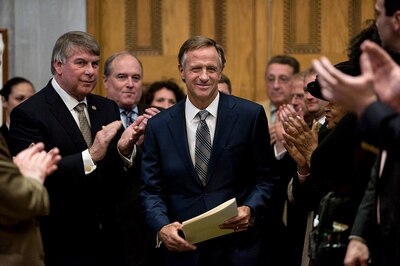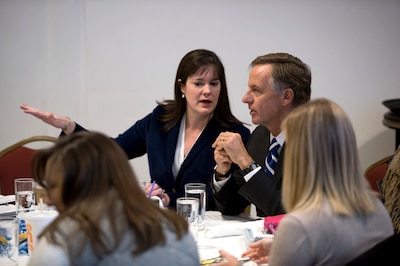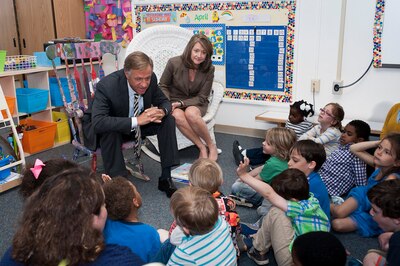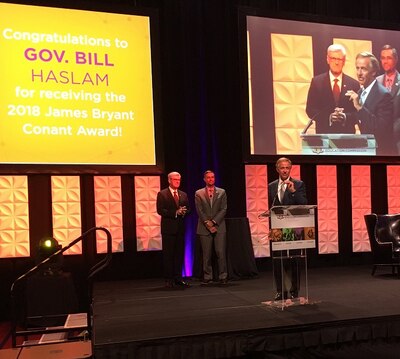While Gov. Bill Haslam entered office as an education-minded leader intent on reforms, much of his administration’s K–12 public school work has focused on holding the line on sweeping policies launched under his predecessor.
Haslam, a Republican, inherited and embraced the changes spearheaded under Gov. Phil Bredesen, a Democrat and fellow former mayor and businessman who led Tennessee’s overhaul to win a $500 million federal Race to the Top award in 2010.
As the term-limited Haslam winds down his eight years in office, he credits those policies — including a controversial one tying state test scores to teacher evaluations — for helping Tennessee become one of the nation’s fastest-improving states in student achievement, even as critics have decried the new system as punitive and demoralizing to teachers.
He has championed higher K–12 expectations while expanding college access for Tennessee students through two pioneering scholarship programs. Last year, the state’s high school graduation rate rose to a record-high 89 percent, and its average ACT score moved above 20 for the first time ever.
Chalkbeat sat down recently with Haslam to discuss his legacy, his accomplishments, and his disappointments — including Tennessee’s struggle to get testing right in the transition to computerized exams under TNReady, its new assessment. His answers have been lightly edited for clarity and brevity.
When you took office, what did you hope to accomplish specifically for K-12 education?
My goal was to make certain that Tennessee wasn’t the laggard in public education that we have historically been. We live in a very rapidly changing world. There is no question that more students need to have some sort of postsecondary credential and, to succeed there, they have to have better K–12 prep. A statistic that grabbed me early was that 70 percent of our community college students needed remedial work when they got to college. I thought, well, that’s just not going to work.
In today’s world, we’re going to keep seeing greater income differentiation unless we give more education opportunity. One of the keys is making certain more people have postsecondary opportunity, but that doesn’t do any good unless you’re prepared when you get that opportunity. And we clearly weren’t preparing students in Tennessee, even though we were telling their parents they were prepared.
You inherited a blueprint for school improvement from Gov. Phil Bredesen’s administration as part of Tennessee’s Race to the Top award in 2010. How did you view that handoff?
Some of the decisions made around Race to the Top were around raising standards, coming up with an assessment that matched those standards, and then having a teacher evaluation tied to the assessment. Those were significant policy decisions, and I realized our job was going to be to stand in the door and not let the state go backward because all of it was hard, whether it be raising standards and people saying you’re expecting too much of our kids; or coming up with an assessment that actually works; or having an evaluation tied to the assessment, which will always be a political issue. I think what we were able to do was to say that Tennessee is finally off in the right direction; let’s don’t turn around. We were rewarded when we got some of the early (national test) results from NAEP, both in 2013 and 2015, showing we really were making that kind of progress. And that helped us in encouraging people not to turn around.
As governor, you have frequently proclaimed Tennessee to be the fastest improving state in the nation based on gains between 2011 and 2015 in math and English on the Nation’s Report Card, known as NAEP. But last year, Tennessee’s NAEP scores were flat and even lost some ground in fourth-grade math. So what’s an honest assessment today? Are you still calling Tennessee the nation’s fastest improving state and, if so, what are you basing that claim on?

If you go back to 2010 and measure every state’s progress since then, I would argue we’re still the fastest improving state in the country. Has our growth slowed down? Yes. Am I concerned about that? You bet. But look at the sheer math of it. When your scores are low, it’s a lot easier to be the fastest improving. Once you’ve moved from being somewhere in the 40s to being in 28th, 29th, 30th, it’s a little harder to continue moving up. Second, there’s no doubt that some of the confusion due to everything from the issues around changes to our academic standards to difficulties in (testing) have hindered our growth more recently. But I would still argue that we are pointed in the right direction. And if you look at that last seven years, I would argue Tennessee has improved more than any other state during that period.
When you look back on the last seven and a half years, what are the things that make you the proudest on K–12 ed?
We really have worked to blow up some of the gaps that exist, whether it be racial or geographical. We’ve said we’re just not going to accept this idea that those kids can’t learn. I remember visiting a school early in my tenure where a principal had put together a roundtable, and two teachers were very specific in saying, “You’re expecting too much of our kids. Our kids are not those kids; our kids don’t go to college.” We’ve said, “No, your kids not only can go to college, but they need to, or at least a larger percentage of them need to.”

Second, we went through the same battle every other state did around the Common Core standards and the political pushback to those. But I think we came up with a good way to land and really ended up in a better place. [By ordering a comprehensive review of Tennessee’s standards,] we took the standards issue off the table, and yet we still have what I think are world-class standards.
Third, I think that one of the benefits of our postsecondary (scholarship) initiatives — Tennessee Promise and Tennessee Reconnect — is that it’s refocused efforts more on K–12 prep. In other words, some were thinking you’re done when you walk across the gymnasium stage and get your high school diploma, and you really don’t care all that much what you learned in high school, as long as you do enough to get that diploma. But now hopefully, we have dinner table conversations across Tennessee that sound different in saying, “You actually can go to college.” So high school matters more now than it did before.
What has been the one hardest thing about K–12 under your administration?
Obviously, the struggles we’ve had with getting the testing right. I think that we actually have a great test that matches the standards we’re teaching and that the standards are good standards. That makes the struggles we’ve had with testing all the worse. And what makes this all the more personally painful is that I firmly believe that having (teacher) evaluations tied to assessments and the accountability that comes with that has been one of the key pieces of our growth. I also know very well that a lot of people disagree with me on that and say it’s a bad idea. And every time we struggle with the test, it gives people ammunition to say you can’t have high-stakes testing because it doesn’t work.
One of my fears is that going forward, whoever sits in this governor’s chair next or whoever is the commissioner of education might not have that same commitment when the heat comes. Every state has had difficulty with online testing as you transition to it. I worry that the struggles will cause us to say, “OK, we give. We’re no longer going to have an evaluation that’s tied to an assessment.” And I think that would be a real loss for the state if we gave up that central tenet that has been part of our progress.
READ: Haslam worries testing troubles could unravel Tennessee education policy
Let’s go a little deeper about TNReady’s administration this spring and the technical problems that spoiled the return to statewide online testing. Education Commissioner Candice McQueen told district superintendents at the end of the second day of testing problems that she and her team were “completely devastated.” As every day seemed to bring forth new testing issues, many lawmakers called for her resignation. Did she offer to resign?

She never did, and I wouldn’t have accepted it. I think to say the testing issues were Candice’s fault is a complete mistake.
You have to go back and remember how we got here. Basically, the Legislature said let’s quit using PARCC or any Pearson-related test. [PARCC is the multi-state testing consortium, also known as the Partnership for Assessment in College and Career Readiness, which Tennessee pulled out of in 2014 because its test was based on Common Core standards. Pearson is PARCC’s testing company.]
We had a test that had been nationally tested that we had been using and was working well. But because of some of the fears of Common Core being part of a national agenda, people said we don’t want to use any of the big testing companies. It was the clear message. This happened before Candice even came. Kevin Huffman was education commissioner, and a lot of people in the Legislature had their doubts about Kevin and whether he was somehow part of what in their mind was this kind of national plan around education. And they didn’t want Kevin to be involved in picking the new testing vendor. So we immediately precluded ourselves from using any of the vendors who had done testing on that scale before. And then we took Kevin, who knew more about how testing should work, out of the whole RFP process. We were somewhat hamstrung by the state’s procurement process, and we ended up with a list of vendors that hadn’t had that kind of experience in implementing online testing and weren’t used to the volume of students we had.
READ: Why Tennessee’s legislators share blame, too, for TNReady headaches
I don’t use that to blame anyone. Ultimately, the issues we’ve had are our fault. But you do have to remember how we got here. We didn’t just all of a sudden go out and blindly say, “Oh, I think we’ll use these folks (as our testing vendor).”
By getting testing wrong again this year, are you concerned that Tennessee could end up undoing what it may be getting right? Do you worry that public outcry could unravel Tennessee’s policy work on standards, testing, and accountability?
I do, because unfortunately in today’s world, we’re not great at tying cause and effect. We’ve made these gains which everybody loves and everyone celebrates, and we have employers looking at Tennessee that never looked at us before. But those gains were a result of hard decisions, and the easy thing to do is to give in to all that. We would go backward. So do I worry about that? You bet. Matter of fact, if you said, why did I have a pit in my stomach the whole time (TNReady) was happening, it was because of that very thing — that a lot of people would say, “This is too hard, and we’re hearing too many complaints.”
We’re in a Social Media Age, and that’s what’s different today from when I started seven years ago as governor and definitely 40 years ago when I was an intern in the U.S. Senate. In those days, when citizens had issues, they wrote us letters and we wrote them back. Now, instantaneously while legislators are on the floor, they’re hearing from people. But we have to be very careful, both in the Legislature and in the administration. There are people who have opinions and preferences, and it is easy to stir folks up to express those in today’s world. I can easily find 50 teachers in every legislator’s district who don’t like what we’re doing and encourage them to send a Facebook message right now. It’s important for all of us to step back from social media and to realize that 50 messages right away may or may not be the full story. That’s a challenge, not just with education issues but with all issues, that I worry about for our democracy today.
In the race to succeed you, there is a fair amount of saber rattling around TNReady. In the Republican primary, U.S. Rep. Diane Black says the test is failing our kids, and Bill Lee told us that he’s open to changing the assessment process if it’s not meeting goals. Among Democrats, House Minority Leader Craig Fitzhugh says it’s time to start over on TNReady. Given that TNReady is the linchpin of the state’s accountability system for education, how would you respond?
Do we really want to go back? Do we really want to go back to when Tennessee was in the 40s out of the states ranked 1 to 50? And the obvious answer from anybody is going to be no. So the question is, well how did we move the needle? And we have moved the needle by standards, assessments, and evaluations tied to those assessments. Is that a difficult process? You bet. The truth is, Tennessee made those decisions on a bipartisan basis before I got here. I actually do agree with those decisions. I knew my job would be to stand in the door because I knew there would be pushback. I think we’ve done a good job of that. Obviously the TNReady issues have made that much more difficult. And if I’m running for office right now, I don’t know that I’d be planting my flag by TNReady, so I understand that. But I do hope everybody realizes how we got where we have gotten to in regards to education process and doesn’t let all that slip back through our fingers.
Is there anything currently missing or misrepresented on education in this gubernatorial campaign, or any point that you’d like to make as this election year ramps up?
Some of the noise around TNReady has overshadowed everything else, and one of those things is we’ve gotten a lot of national recognition recently for being a state that fairly portrays where our kids are in proficiency. We went from being an F on honesty the year before I got here to being a B- three years ago to getting an A this year. Ultimately, one of our responsibilities is to tell parents accurately how well their child is doing in school. So amid all the clamor over TNReady, we shouldn’t lose the fact that we’ve closed our honesty gap. That’s a huge thing, but it doesn’t necessarily play very well out there across Tennessee. We live in a world where the politics of opposition are stronger than the politics of support. So it’s a lot easier to be against something and, unfortunately because of our struggles around TNReady, it’s a pretty easy thing to be against. But a leader’s job in education is to say, let’s realistically assess where we are and then be relentless about driving to the results that we want.
Let’s talk money. Despite some big investments that have come under your administration, the state also has been sued by three of its four largest districts over the adequacy of school funding. Those lawsuits are ongoing. On a related matter, Randy Boyd, your former economic development commissioner who is running for governor, has called the state’s formula for funding education “antiquated and arcane” and in need of a redesign that reflects the modern needs of students. What about our level of funding for schools, and is it also time to overhaul the state’s Basic Education Program funding formula?

We’ve added $1.5 billion in new dollars to public education, far more than any other administration has ever done. So to folks who say we’re not really committed to public education, I’d say we actually have put our money where our mouth is.
On the BEP formula, I think I said similar things when I was running for governor. Everywhere you go, you hear complaints about the formula. People think they’re getting the short end of the stick. Nobody thinks they’re coming out great. Some of the larger metropolitan systems are suing us but, when I came in, we were being threatened by the small school systems and historically the state has struggled with that as well. Three years ago, we said we’re going to totally redo the BEP formula. We came in and looked at turning it inside out in every way possible. But it was very difficult because, when you change it, you’re going to have winners and losers. You just are. And so the only way to change it is to do it like we did — in times when you add more money to the pie. If you’re just going to cut it up differently, it won’t work because the mad people will be madder than the happy people will be happy.
Literacy is an issue that both you and the first lady have prioritized. There is a growing consensus that quality pre-K could be the key to addressing the state’s early reading problems and low literacy rates. But it is a significant investment, and studies have shown that Tennessee hasn’t quite gotten the quality of pre-K right for the most part. What would your message be to the next governor when it comes to pre-K?

I would say the next governor should continue to study whether additional public education dollars are best suited to go toward pre-K or to a lot of the other places where we have put public education dollars: teacher salaries, more technology, etc. I think we’ve made the right decision while we’ve been here, but I’m not saying that will always be the right place.
One of the issues around reading is this. You have some parents who are literally reading to the child in the womb, and you also have far more students than we would like to admit who come to kindergarten having never picked up a book. There are homes in Tennessee that don’t have a book. Children literally come to kindergarten not knowing which way to hold a book. When you think about those two different situations and trying to provide some sort of fair opportunity, it shows the depth of the challenge. If I was going to be the next governor, I would not take more pre-K investments off the table. So far, the data has not shown the kind of improvements that we would like. But is that a quality issue or a fundamental concept issue? The next governor needs to try to evaluate that.
One thing that has been extraordinary about Tennessee is that for more than a dozen years and under two different administrations — one Democrat, one Republican — Tennessee has, for the most part, kept that same general blueprint for improving schools. But in an increasingly tense and partisan national political environment, is education reform even possible any more, or do you think those agendas are being squeezed out too?
You’re exactly right. We’ve actually been through an extraordinary period. First, we had President George W. Bush and No Child Left Behind. People had some issues around No Child Left Behind in the end, and I did too. But it was founded on an extraordinary idea for a Republican president — the idea that I don’t care what the zip code or what the child’s background, every child deserves the right to a great education. Then you had a Democrat president who came in and really put in all those basics that we talked about in Race to the Top. We’ve got to raise our standards. We’ve got to have great assessments and, most importantly, we have to have an evaluation tied to the assessment — going against the teachers union, the Democrats’ biggest base. So it’s been extraordinary, with an extraordinary amount of talk and focus put on K-12 education.
Now go back to the last election of 2016. Nobody talked about education, period. There was some talk about the free college ideas, but nobody was really talking about K–12 education issues the way that Bush and Obama had addressed those. So I think if you talk to a lot of people nationally in the reform movement, they’d say we’ve entered a different time. That’s not just about Donald Trump. It just wasn’t an issue in the 2016 presidential election. I personally think we’re making a grave mistake. As a country, we had made some really big steps forward. I worry about us having the consensus to keep it moving.
As governor, you just won a major national award from the Education Commission of the States for your contribution to American education. Now that you’re leaving office, is it hard to walk away from the conversation on education, both in Tennessee and at the national level?

It is. I really don’t know what I’ll do next, but I will stay involved in education issues. I just fundamentally believe it’s the most important thing we do. Income inequality is a huge issue in our country. Forget what your politics are. It just is. And I think the only way to start to address that is public education. Some people think we can address it with new tax policies, or new poverty policies. I think keeping the focus on raising the standards and expectations around public education is our hope as a country. I hope to continue to be able to play a part in that conversation. I’ll be very careful not to violate the one-governor-at-a-time rule, so don’t expect me to be in the middle of arguments in the Legislature next year. But I do want to be involved in education issues. I just care too much to walk away from all that.


